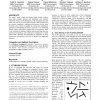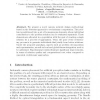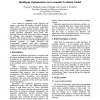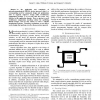120
Voted
GECCO
2005
Springer
15 years 7 months ago
2005
Springer
This paper describes our procedure and a software application for conducting large parameter sweep experiments in genetic and evolutionary computation research. Both procedure and...
104
click to vote
GECCO
2005
Springer
15 years 7 months ago
2005
Springer
Finding motifs — patterns of conserved residues — within nucleotide and protein sequences is a key part of understanding function and regulation within biological systems. Thi...
99
Voted
GECCO
2005
Springer
15 years 7 months ago
2005
Springer
The C-value Paradox is the name given in biology to the wide variance in and often very large amount of DNA in eukaryotic genomes and the poor correlation between DNA length and p...
103
click to vote
GECCO
2005
Springer
15 years 7 months ago
2005
Springer
The Army’s push towards developing highly flexible military teams that combine manned and unmanned units requires significant advances in the intelligence of the unmanned units ...
115
Voted
EVOW
2005
Springer
15 years 7 months ago
2005
Springer
We present a novel camera network design methodology based on the Parisian approach to evolutionary computation. The problem is partitioned into a set of homogeneous elements, whos...
134
click to vote
IROS
2006
IEEE
15 years 8 months ago
2006
IEEE
— We created a human-robot communication system that can adapt to user preferences that can easily change through communication. Even if any learning algorithms are used, evaluat...
109
click to vote
ICTAI
2006
IEEE
15 years 8 months ago
2006
IEEE
A new method for optimizing complex functions and systems is described that employs Learnable Evolution Model (LEM), a form of non-Darwinian evolutionary computation guided by mac...
90
Voted
ICANNGA
2007
Springer
15 years 8 months ago
2007
Springer
This paper describes a new technique for automatically developing Artificial Neural Networks (ANNs) by means of an Evolutionary Computation (EC) tool, called Genetic Programming (G...
106
click to vote
GECCO
2007
Springer
15 years 8 months ago
2007
Springer
Modularity is thought to improve the evolvability of biological systems [18, 22]. Recent studies in the field of evolutionary computation show that the use of modularity improves...
89
Voted
CEC
2007
IEEE
15 years 8 months ago
2007
IEEE
—As the application and complexity of microelectromechanical (MEMS) devices increases, there is a corresponding need for automated design and optimization tools to augment engine...






